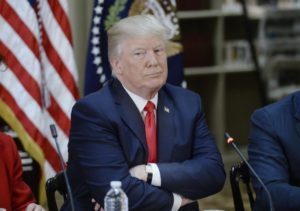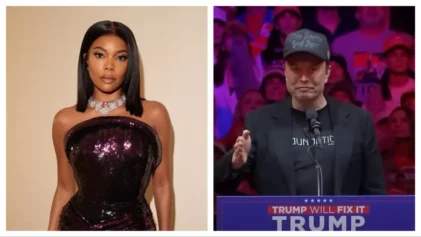
President Donald Trump, speaking during a strategic and policy discussion with CEOs on April 11, 2017, in Washington D.C., has the lowest 100-day rating in history, according to a Gallup poll. (Photo by Olivier Douliery-Pool/Getty Images)
“The electoral college is a disaster for democracy,” tweeted Trump in 2012. Just five years later, that same system would award him the presidency. Hillary Clinton may have won the popular vote by over three million votes, but like Gore before her, she lost the election.
As President Trump closes in on his first 100 days in office, he has continued to celebrate his electoral victory as “the greatest since Reagan,” despite facts that prove otherwise. His sudden embrace of the electoral system is like many other things in Trump’s world: Unpredictable, uninformed and a complete reversal from previously held beliefs.
If he didn’t hold the highest office in the land, Trump’s pivots could be laughed off. But as the leader of the so-called “free world” with the power to unleash havoc and military destruction, his lack of consistency matters both domestically and internationally, where Trump’s foreign policy these first 100 days has been anything but consistent.
Just as he was on the campaign trail, the first 100 days of Trump’s international diplomacy has been marred by controversy, confusing both ally and opposition alike and setting a dangerous tone of unpredictability that has rattled the world.
One of the key issues demonstrating Trump’s love of flip-flopping is his turn-around on the importance of the North Atlantic Alliance, better known as North Atlantic Treaty Organization (NATO). Signed in 1949, the military alliance consists of several European and North American nations that have agreed to come to the aid of any NATO nation that is attacked. In the world of “realpolitik,” NATO is as much an offensive strategic alliance as a defensive one. It has frequently taken the lead in initiating Western invasions of foreign lands. The cornerstone of post-World War II Western military strategy, it was initially deemed useless by Trump and he hinted at removing the U.S. from it.
As a candidate, Trump frequently claimed that the U.S. pays the “lion share” of the budget and that the other nations were not paying their fair share, insisting that the alliance was taking advantage of the United States. But. after calling the trans-alliance “obsolete” as recently as March 22, less than a month later, he would stand beside NATO General Jens Stoltenberg and claim that his grievance stemmed from their failure to focus on terrorism, something NATO has actively targeted for nearly 30 years.
As Trump explained it, “The secretary general and I had a productive discussion about what more NATO can do in the fight against terrorism. I complained about that a long time ago and they made a change, and now they do fight terrorism,” adding “I said it was obsolete. It’s no longer obsolete.”
According to former United States NATO Ambassador Ivo Daalder, it never was. “Nothing has changed at NATO in the last 80 days. It’s gratifying to see the president affirming that NATO is ‘no longer obsolete.’ It never was,” Daalder said. “Perhaps the one most important thing that has changed in the last 80 days is that as president, Mr. Trump has come to appreciate the importance of this alliance and how it contributes to security and stability in Europe and beyond.”
The switch also drew criticism from far-right French presidential candidate Marine Le Pen, who said, “I am coherent. I don’t change my mind in a few days. He said he would not be a policeman of the world, that he would be the president of the United States. But it seems today that he has changed his mind. Undeniably, he is in contradiction with the commitments he had made.”
The White House tone regarding China has apparently shifted as well during these first 100 days. After repeatedly accusing China of being a “world champion” of currency manipulation, Trump now says he will drop the label. He announced on April 12 that “China hasn’t been manipulating its currency for months” because denouncing the Chinese now could jeopardize his talks with Beijing on confronting the threat of North Korea.
Responding to Trump’s recent Twitter activity, North Korea’s vice foreign minister advised that, under this administration, the U.S. is “becoming more vicious and aggressive.” Adding, “We will go to war, if they choose,” North Korea has been warning the United States for years, but whereas his successors had largely used diplomatic methods to prevent a global assault on the region, Trump has allowed himself to be reeled into a war of (Twitter) words.
An exposed political novice, Trump kept insisting that China should easily be able to handle North Korea. However, after meeting in person with President Xi Jinping, who gave Trump a history lesson on the Korean peninsula, Trump’s lack of awareness was shattered, causing Trump to admit to the Wall Street Journal that, “After listening for 10 minutes, I realized it’s not so easy. I felt strongly that they had a tremendous power … but it’s not what you would think.” Trump is now left to craft a cohesive strategy against North Korea that involves China. To win its involvement, Trump has now learned that bellicose behavior and harsh rhetoric via tweets is not a policy for confronting world problems.
Then, there’s Syria. Before running for office, Trump had been quick to denounce any plans for military action against the nation, taking to Twitter as early as 2013 to announce that “The only reason President Obama wants to attack Syria is to save face over his very dumb red line statement. Do not attack Syria, fix U.S.A.” Adding, “Again, to our very foolish leader, do not attack Syria – if you do many very bad things will happen and from that fight the U.S. gets nothing!”
Now, during his short presidency, one can only wonder what “many very bad things” await the U.S., thanks in part to the April 6 strike on the Shayrout air base — a move made by Trump following reports that Syrian President Bashar al-Assad had employed chemical weapons against his own citizens. Despite claiming that he had been “moved” to act by the images of children caught in the cross hairs of civil war, to date Trump has said nothing about changing his executive order banning Syrian refugees into the country. Trump has now signaled that the United States may actively once again be involved in regime change. Despite his claim of this action being a one-off, it has heightened tensions with both Russia and Iran, and has not changed any dynamics on the ground, as the airfield attacked by U.S. missiles was being used the next day for other military actions by the Assad government.
Normally, most president’s approval ratings soar after displaying military might. Not so for Trump. According to a recent Gallup poll, Trump has the lowest approval ratings of any president approaching his first 100 days, with over 45 percent of Americans believing that Trump is dishonest. As Trump supporter and American Conservative editor Scott McConnell recently wrote, “I certainly didn’t vote for the foreign policy preferences of Jared and Ivanka, or a policy driven by whatever images on TV happened to move the president. The Syrian strike and the administration’s words to justify it significantly weaken the case for believing Trump will actually improve things.”
Lets hope the next 100 days are not as bad as the first.


